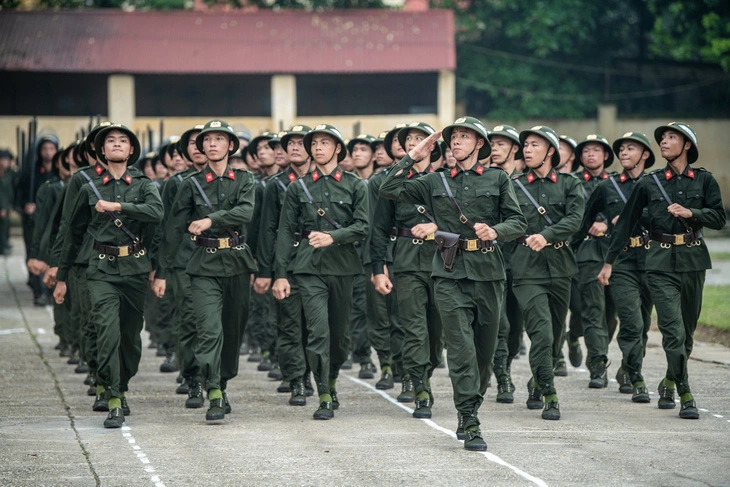The Vietnamese Ministry of National Defense has recently announced it will consider proposing amendments to legislation related to military service recruitment to prevent a number of young people from abusing body tattoos as a way to dodge conscription.
The ministry made the announcement after having listened to opinions of people in southern Tay Ninh Province as well as from some other localities over the past several years regarding this issue.
To evade military service, many young men intentionally get tattoos before their medical exams for recruitment, as a way to avoid being selected, according to the people's reports.
Residents of Tay Ninh commented that these young men are unfairly exploiting Joint Circular No. 50/2016 from the Ministry of National Defense and the Ministry of Public Security, which outlines the political requirements for conscripting citizens into the Vietnamese People’s Army.
As per the joint circular, citizens with tattoos will not be selected for military service, prompting many young people to intentionally get inked to disqualify themselves from recruitment.
In light of this situation, people have urged the defense ministry to implement measures to prevent citizens from abusing tattooing to evade military service, in order to uphold social equality and ensure an adequate number of qualified citizens for army recruitment.
According to the ministry, the current regulation regarding tattoos is part of the political and ethical standards for selecting citizens for military service.
Citizens will not be selected if their bodies bear tattoos with images or words that oppose the regime, promote division, or are deemed horrifying, bizarre, violent, or sexually provocative.
Tattoos that are offensive in visible areas, such as the face, head, and neck, or those located from the lower half of the upper arm down, one-third of the lower thigh down, or covering half or more of the back, chest, or abdomen, are deemed unacceptable.
The ministry stated that if selected for military service, citizens with such tattooing would be considered offensive, negatively impacting the image, etiquette, and conduct of revolutionary soldiers, as well as the cultural environment within the army.
However, the ministry clarified that citizens with removable tattoos that do not contain the aforementioned content may still be eligible for military service.
The ministry acknowledged that some citizens have exploited this regulation to avoid military service, leading to discontent among the public.
To prevent abuse of the regulation, the ministry issued a dispatch in late 2019 urging military service councils to collaborate with relevant agencies to accurately identify and classify tattoos for acceptance.
They also called on citizens with unacceptable tattoos to have them removed to qualify for military service.
Currently, there are no legal provisions prohibiting individuals from getting tattoos, nor is there a ban on body tattoos for young men of military service age who have not yet undergone health examinations for recruitment.
In November 2020, the ministry issued guidance stating that if tattoos cover a small area and do not impact the military etiquette, discipline, or environment, citizens with such tattoos will still be considered for military service, according to Vietnam Television.
Concerns about the abuse of body tattooing to evade military service have been raised not only by residents of Tay Ninh but also by people from other provinces and cities, including Hai Phong, Thanh Hoa, Ha Tinh, Nghe An, and Nam Dinh, over the past few years.
In response to these concerns, the ministry has announced plans to study and fully evaluate tattoo-related policies and their impacts, proposing amendments to Government Decree No. 27/2016, which outlines various regimes and policies for in-service and demobilized non-commissioned officers, soldiers, and their families.
The ministry will collaborate with relevant ministries to amend Joint Circular No. 50/2016 at an appropriate time, ensuring that there is a comprehensive political, legal, and practical foundation for the changes.
This aims to ensure that the regulations on military service recruitment are implemented effectively, practically, and rigorously.
Like us on Facebook or follow us on Twitter to get the latest news about Vietnam!


















































